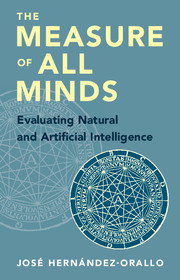Book contents
- Frontmatter
- Contents
- List of Panels
- Preface
- PART I A LONG-PONDERED OUTFIT
- PART II THE EVALUATION DISCORDANCE
- PART III THE ALGORITHMIC CONFLUENCE
- 7 Intelligence and Algorithmic Information Theory
- 8 Cognitive Tasks and Difficulty
- 9 From Tasks to Tests
- 10 The Arrangement of Abilities
- 11 General Intelligence
- PART IV THE SOCIETY OF MINDS
- PART V THE KINGDOM OF ENDS
- References
- Index
- Plate section
11 - General Intelligence
from PART III - THE ALGORITHMIC CONFLUENCE
Published online by Cambridge University Press: 19 January 2017
- Frontmatter
- Contents
- List of Panels
- Preface
- PART I A LONG-PONDERED OUTFIT
- PART II THE EVALUATION DISCORDANCE
- PART III THE ALGORITHMIC CONFLUENCE
- 7 Intelligence and Algorithmic Information Theory
- 8 Cognitive Tasks and Difficulty
- 9 From Tasks to Tests
- 10 The Arrangement of Abilities
- 11 General Intelligence
- PART IV THE SOCIETY OF MINDS
- PART V THE KINGDOM OF ENDS
- References
- Index
- Plate section
Summary
After composing many general arts, I want to explain them more clearly with this, the Ultimate Art, so named because we do not intend to make any other art more general than this one, as we compiled this art from the other arts.
– Ramon Llull, Ars Generalis Ultima (1305)IN THE PREVIOUS CHAPTER, we saw that a hierarchy or clustering of abilities can in principle be performed independently of a particular population, provided we use a ‘solutional’ notion of similarity, and slice tasks by difficulty. In any case, given the similarities between tasks, any taxonomy will require further criteria, making it arbitrary in one way or another. One possible way towards an evaluation that is not task-specific but does not require any taxonomy is the definition of the most general ability. Two pathways are investigated: (1) the consideration of all possible tasks and (2) the construct that relates to all other tasks, a universal g factor.
ARS GENERALIS ULTIMA: OPTIMAL AGENTS
In Chapter 1 we recalled how Llull tried to build an ars generalis, which could solve all solvable problems. Is this at all possible? Is there such a general mechanism, at least theoretically? Why do we refer to solvable problems? Let us bring this to our time and our measuring context.
First, the notion of a solvable problem is straightforward with the constructs seen in Chapter 8. Given a tolerance, a task μ is unsolvable if its difficulty is infinite, i.e., no policy using finite resources can solve it. Otherwise, it is solvable. As we saw, this notion of solvability means that there is an acceptable policy π, i.e., the expected result during ν trials is above the threshold set by the tolerance, namely (see Eq. 8.1). Second, the question of an ars generalis can then be formulated as follows: given a tolerance, and all the solvable tasks for that tolerance, can we find one single policy that is acceptable for all of them?
- Type
- Chapter
- Information
- The Measure of All MindsEvaluating Natural and Artificial Intelligence, pp. 283 - 310Publisher: Cambridge University PressPrint publication year: 2017



